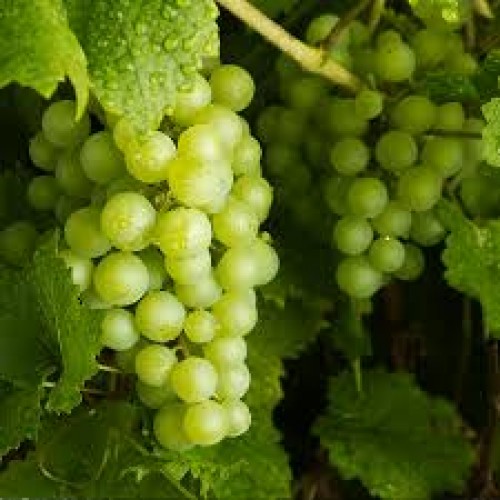off
-
Sold
-

out
Green Grape Plant: Uses, Care & Advantages
The Green Grape Plant (Vitis vinifera) is a popular fruit-bearing vine known for its sweet, juicy, and refreshing green grapes. Grown in temperate to warm climates, green grapes are used in fresh consumption, juicing, wine-making, and dried into raisins. Aside from their delicious taste, they are packed with health benefits and are a rewarding plant to cultivate.
Care of the Green Grape Plant
With proper care, grapevines can produce fruit for decades. Here's how to maintain a healthy green grape plant:
- Climate: Prefers warm, dry summers and mild winters. Requires a frost-free growing season.
- Sunlight: Full sun is essential—at least 7 to 8 hours daily for optimal growth and fruit production.
- Soil: Well-drained sandy or loamy soil is ideal. Grapes prefer slightly acidic to neutral pH (6.0–7.0).
- Watering: Regular but moderate watering. Avoid waterlogging. Drip irrigation is preferred during fruiting.
- Fertilizing: Use compost and balanced fertilizers (NPK 10-10-10) during early growth stages. Avoid excessive nitrogen.
- Pruning: Prune heavily in the dormant season to promote new vine growth and increase fruit yield.
- Support: Use trellises, arbors, or wires for the vines to climb and spread efficiently.
- Pest & Disease Control: Watch for powdery mildew, aphids, and grapevine beetles. Use organic sprays or neem oil as needed.
Advantages of the Green Grape Plant
- Nutrient-Rich: Green grapes are rich in Vitamin C, Vitamin K, potassium, and antioxidants like resveratrol.
- Heart Health: Helps reduce blood pressure and supports cardiovascular health.
- Good for Digestion: Contains dietary fiber and water content that aids digestion and hydration.
- Anti-Aging Benefits: Antioxidants help protect skin and fight free radicals.
- Long-Term Harvest: Once mature, grapevines produce fruit annually for 30–40 years with proper care.
- Aesthetic Appeal: Grape vines are attractive, making them ideal for garden trellises and patio decoration.
Uses of Green Grapes
- Fresh Consumption: Eaten raw as a healthy, sweet snack or in salads and desserts.
- Juicing: Used to make fresh juice, smoothies, and grape-based drinks.
- Wine Production: Certain varieties of green grapes are used in white wine production.
- Drying: Dried into raisins for long shelf life and nutritional snacks.
- Culinary: Used in sauces, jams, jellies, and even savory dishes like roasted meats and salads.
- Medicinal: Used in traditional remedies to treat inflammation, fatigue, and improve metabolism.
Conclusion
The Green Grape Plant is a versatile and valuable addition to any home garden or farm. Whether for its delicious fruit, nutritional value, or decorative charm, it provides long-lasting benefits with relatively simple care. Growing your own grapes is both satisfying and sustainable—bringing beauty and bounty year after year.

